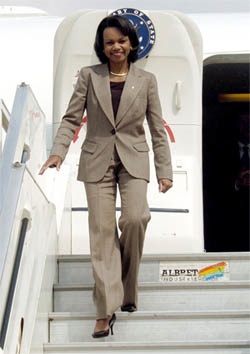
"I tell my students that policy-making is 90 percent blocking and tackling and 10 percent intellectual."--Secretary of State Condoleezza Rice, cited in Mary Beth Brown, Condi: The Life of a Steel Magnolia (Nashville, Tennessee: Thomas Nelson, Inc, 2007), p. 180.
"When you never accomplish anything, your weekly summary of what you've done all week is just a bunch of 'accondishments' -- how you've filled the days."--Noah, a reader of "Princess Sparkle Pony's Photo Blog: I keep track of Condoleezza's hairdo so you don't have to" (May 5, 2008).
Notwithstanding the low poll numbers of the president she serves, US Secretary of State Condoleezza Rice is one of the few people within the Bush administration who has managed to remain relatively unscathed by the public and by pundits. Unlike some in the president's entourage who have left Washington due to criticisms of their performance or ethics, Rice's current standing at home is sufficiently adequate from a PR perspective to allow her (up to now) to stay on in her job without too many embarrassments. True, there have been calls to remove her from her current position because of her recently disclosed role in the administration's use of torture. And doubts about Rice's qualifications as Bush's foreign-policy guru have existed for years, with, for example, her former National Security Council boss in the administration of George H.W. Bush, Brent Scowcroft, stating in 2005 that her "expertise is in the former Soviet Union and Europe. Less on the Middle East." More recently, an article by Patrick Seale, a British writer on the Middle East, talks about "The Tragic Futility of Condoleezza Rice."
But Condi, rising as she has from her solidly middle-class origins in Birmingham, Alabama to the highest echelons of the US government, remains a subject of admiration. Earlier this year the Harris Poll reported that Rice was "still the 'shining star' of the administration." A 2006 profile by BBC News gushed that "Rice's intellectual brilliance is undisputed," and she "has consistently been one of the most popular members of the Bush administration." Pundits have repeatedly floated her name as a possible Republican vice presidential running mate for John McCain. "For a party that up to now has been clueless about how to run against either a woman or a person of color, Condoleezza Rice is pure political gold," explained Nicholas Von Hoffman in a commentary for CBS News.
In fact, Rice's genius and foreign-policy expertise are more image than substance, as recent biographies by Elisabeth Bumiller and Marcus Mabry suggest. In her ascendance to power, Rice's main instrument has not been ground-breaking thinking about important international issues, but rather what Mabry characterizes as "her phenomenal skill at spinning."


 PR firm
PR firm 
 But the pundits weren't just selling government talking points. As
But the pundits weren't just selling government talking points. As